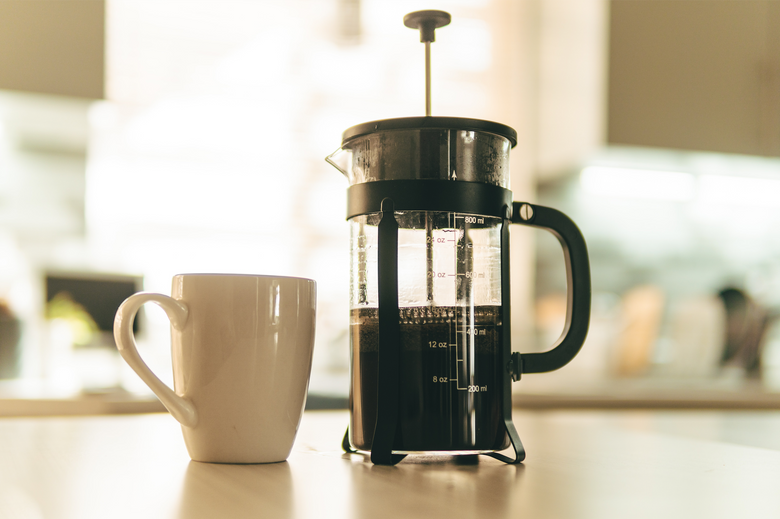There are many reasons to love French Press coffee:
- The simple brewing process
- The rich mouthfeel
- The intense flavors
Many coffee enthusiasts discover their love for specialty coffee through the French Press. There’s nothing quite like the first time you drink expertly brewed coffee.
Although the process is straightforward, learning to brew French Press coffee takes a lot of practice and can be frustrating at times.
We’re here to help! We’ll show you five tricks you can use to remedy your French Press coffee troubles.
By the end, you’ll know how to brew a delicious cup of French Press coffee—free of sour, bitter, or boring flavors.
Brewing French Press Coffee at Home: A Quick Guide
Before we reveal our brewing tricks, let’s review the steps to brew French Press coffee.
You’ll need:
- Whole Bean Coffee
- French Press
- Hot Water
- Burr Coffee Grinder
- Kitchen Scale
- Timer
- Weigh & Grind. Begin by weighing and grinding 50g of whole bean coffee using a coarse grind setting on your burr grinder.
- Prep the French Press. Next, place the brewer on the scale, add the ground coffee, and tare the scale to zero. Begin the timer.
Brewing Tip: Before prepping the French Press, try adding some hot water to the vessel. This helps retain heat throughout the process. Remember to discard the hot water before brewing!
- Add Hot Water. Add 800-850ml of hot water to the French Press, based on your taste preferences. At 1:00, give the coffee a stir using a spoon. This motion breaks up the crust that forms and ensures all the grounds are evenly saturated.
- Let It Steep. Place the filter and top of the French Press on, with the filter just barely touching the surface.
- Plunge & Enjoy. After four (4) minutes, slowly push the plunger down and serve immediately.
Read: The Ultimate Guide to French Press Coffee
If you follow these steps and your coffee’s not tasting quite right, we’ve got your back. Check out these easy French Press troubleshooting tips.
How to Solve 5 Common French Press Problems
Problem: Coffee Tastes Sour or Bitter
Solution: Change the grind size.
The majority of French Press problems are caused by the incorrect grind size.
For French Press coffee filled with exciting flavors, use a coarse grind size.
When coffee grounds come in contact with hot water, the natural compounds inside (acids, sugars, oils, etc.) are pulled from the grounds. The finer the grind size, the quicker these natural flavors are extracted. If extraction happens too fast, we run the risk of extracting unwanted flavors like bitterness.
It’s all about finding the sweet spot for each coffee and brew method.
Since the French Press is an immersion brew method, the coffee and water will be in contact for several minutes—meaning we want to slow down the extraction with a coarse grind size.
Otherwise, the coffee may taste bitter and bland from being over-extracted.
Pro Tip: If you use a coarse grind and the French Press coffee has a sour taste, you can grind a little finer to speed up the extraction process and remedy this.
Read: How To Pair Your Coffee Brewer With Its Perfect Grind Size
Problem: Coffee Still Tastes Sour or Bitter
Solution: Adjust the brew time.
A standard French Press recipe lets the coffee steep in the water for four minutes.
But this rule isn’t written in stone.
If you’ve already adjusted the grind size several times and your coffee still isn’t tasting right, try altering the brewing time.
For example, if your coffee is a bit sour, try extending the brewing time and give your recipe a chance to extract more of the natural flavors. Or, for troubleshooting a bitter coffee, reduce the brewing time and halt the extraction process.
Remember: Every coffee is different! One coffee may taste great with a medium-coarse grind and a 4:00 brew time, while another does well with a coarse grind and a 3:30 brew time. It’s all about finding that sweet spot!
Problem: Coffee is Too Heavy
Solution: Alter the coffee-to-water ratio.
The mesh stainless steel French Press filter allows fine coffee particles and oils to remain in the final cup. These organic compounds aren’t being soaked up by a paper filter during the brewing process. This difference creates the heavy or “thick” mouthfeel that French Presses are known for.
Some people adore this characteristic in their coffee, while others aren’t a fan.
But, just like the grind size and time, it’s all about finding balance. Adjusting the coffee-to-water ratio of your brewing recipe will help you accomplish this!
Here’s a quick cheat sheet:
Problem: Grounds in Coffee
Solution: Use the sediment trick.
Since French Press coffee does not use a paper filter, a few tiny bits of coffee sediment may end up in your cup.
Don’t worry!
It’s completely normal and won’t drastically alter the taste.
But, if you don’t enjoy sediment in your coffee, there’s a little hack you can use to reduce the chances of this happening.
All you need are two spoons.
About 15-30 seconds before the end of the brewing time, remove the top of the French Press and use both spoons to gently skim the surface, collecting all the floating coffee grounds. Quickly throw the grounds out, reattach the filter, and plunge away.
Read: 5 Things Every French Press User Should Know
It’s important to note that this technique won’t completely eliminate sediment. You can always run your French Press coffee through a paper filter before drinking to catch any lingering coffee grounds.
Problem: The Second Cup Tastes Terrible
Solution: Only brew what you’ll drink immediately.
A French Press is capable of brewing multiple cups of coffee at once, making it a great choice when entertaining guests.
But, have you ever made yourself several cups of French Press coffee and noticed that the first cup tastes far superior to the second?
This happens because the coffee is still brewing after it’s been plunged!
The remaining coffee in the French Press is only separated from the grounds by a thin stainless steel mesh filter. This means the bitter compounds from the spent grounds are actively being added to the coffee still inside the French Press!
To combat this, only make as much coffee as you can consume immediately OR pour all of the coffee into a serving carafe after brewing.
It’s All About the Beans
If you’ve tried all of our tricks and your French Press coffee still tastes off, we’ve got some bad news for you:
The problem isn’t the French Press, it’s your coffee. Pre-ground, commercial-grade, and flavored coffee will all taste mediocre and boring when brewed in a French Press.
Using whole bean specialty-grade coffee, ground right before brewing, is the only way to unlock the irresistible natural flavors you want in your morning cup of coffee. Once you taste the difference, you’ll never brew a French Press without specialty coffee again.
👉 Click here to try JavaPresse Coffee and take your French Press coffee to the next level.



